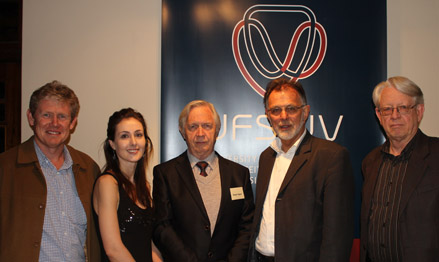Latest News Archive
Please select Category, Year, and then Month to display items
31 January 2024
|
Story EDZANI NEPHALELA
|
Photo ANJA AUCAMP
 Dr Martin Laubscher’s thesis, crowned with the Andrew Murray-Desmond Tutu Prize, is testament to the university’s unwavering commitment to scholarly excellence.
Dr Martin Laubscher’s thesis, crowned with the Andrew Murray-Desmond Tutu Prize, is testament to the university’s unwavering commitment to scholarly excellence.
In a historic triumph that reverberates over four decades since its inception, the UFS has clinched the coveted
Andrew Murray Prize – now renamed the Andrew Murray-Desmond Tutu Prize – for the first time. Standing shoulder to shoulder with institutions such as the University of Pretoria (UP) and Stellenbosch University (SU), this achievement marks a significant milestone in the UFS’ journey.
At the heart of this accomplishment lies the profound contribution of
Dr Martin Laubscher, distinguished Senior Lecturer specialising in Practical and Missional Theology in the
Faculty of Theology and Religion. Dr Laubscher’s dedication and scholarly prowess culminated in the groundbreaking work titled
Publieke teologie as profetiese teologie? (Public theology as prophetic theology), a revised edition of his doctoral thesis, which was originally crafted at Stellenbosch University in 2020, with a focus on the eminent Karl Barth.
Dr Laubscher received the Andrew Murray Prize for Theological Books in Afrikaans for his research and insightful analysis. The journey started when he realised, under the guidance of his study leader,
Prof Dion Forster, that his script had the potential to be published in Afrikaans. Sun Media’s interest in publishing this work in Afrikaans, led to it being the first-ever published thesis in Afrikaans. Dr Laubscher recalls, “I was grateful and excited about Sun Media’s interest. The book emerged within a year, and during a celebratory launch Prof Forster suggested I submit it for the Andrew Murray Prize.”
Earlier this year, Dr Laubscher was excited to learn that he was being shortlisted for the prestigious award. Reflecting on the significant moment, he shares, “The elation I felt upon receiving the news was unparalleled. I was not only celebrating a personal triumph, but also etching my name as the first laureate from our faculty to secure this prestigious accolade.”
Supplementum analyses the San origin of South African place names
2013-09-25
|
 |
|
At the launch were, from the left: Prof Lucius Botes (Dean: Faculty of the Humanities), Christine van Deventer (SUN MeDIA), Prof Peter Raper (author), Prof Theodorus du Plessis (Head of Department: Linguistics and Language Practice), and Prof Dirk van den Berg (outgoing editor).
Photo: Jerry Mokoroane
25 September 2013 |
The Acta Academica Supplementum 2012 (2), under the outgoing editorship of Prof Dirk van den Berg, was launched on 16 September 2013. The author, Prof Peter Raper, is one of the leading place-name experts in South Africa. The Supplementum analyses the San origin of South African place names whereby different layers of language contact are exposed. For example, Dipodi (previously Jakkalsdraai), is an adaptation of the original San name. The first ‘di’ is the added Sotho preposition. ‘Po’ is equal to the San word ‘po’ (jackal) and the last ‘di’ equal to ‘/gi’ (to bend). Prof Raper’s research indicates that many place names carry evidence of various language shifts. By analysing these language layers, different phases of language contact are exposed. This research is instrumental in the preservation of a unique aspect of the South African cultural heritage.
Prof Raper is since 2011 Honorary Professor: Linguistics, in the Department of Language Management and Language Practice at the University of the Free State. He is one of South Africa’s leading toponymists. The fourth edition of the New Dictionary of Southern African Place Names, with Dr Lucie Möller and Prof Theodorus du Plessis as co-editors, is currently in the press. He is a member of the Commission for Toponymy of the International Geographical Union, as well as the Working Group for Toponymy of the International Cartographic Association, of which there are only ten members worldwide, and a member of the Editorial Advisory Board for the journal Names.